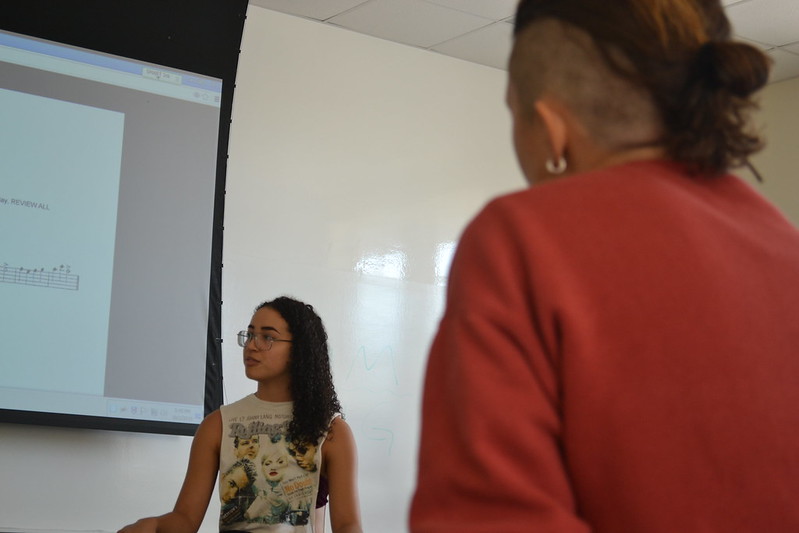
Chemistry thesis students who are teaching assistants (TAs) are making almost double the amount of any other TA for any other discipline this school year all thanks to one professor and some paperwork.
“The wages for TAs haven’t changed since I’ve been a faculty member here,” Professor of Chemistry Steve Shipman said. Shipman is a Gender Studies program advisor and has been a faculty member since 2008. “At the same time though, minimum wage has gone up, gas prices have gone up, all of this other stuff has gone up. So now basically the TAs are earning a little bit more than minimum wage but, at the same time, the states cut back support for Bright Futures and their tuition has gone up. What’s happening is that our students are going to work more and more hours just to get by. I wanted to make a bold step to try to address that.”
Shipman filled out an application to receive funding from the Faculty Development Fund in order to increase the salary for chemistry TAs from $8.25, the standard for all other TAs, to $15 per hour. Shipman reportedly did not expect to receive funding, but wanted to apply in order to make a statement. Once Shipman received news that his request had been approved, he sent out a copy of his application to the rest of the faculty in the Natural Sciences division to encourage them to apply as well.
“To the best of my knowledge, I am the only one who did,” Shipman said. “And that is why it’s only the chemistry people who are seeing the reward.”
Chemistry TAs work roughly five to six hours a week. They help faculty members by often becoming co-authors to the research they conduct as well as grade exams, help students and hold TA sessions.
“It feels better working as an organic chemistry TA knowing that I make $15 an hour,” thesis student Zachary Decker said. Decker also works two other on-campus jobs in the Quantitative Research Center and the Writing Research Center. “It most certainly should extend to other TAs because I see no reason as to why Chemistry TAs should get special treatment over other TAs. It doesn’t make any sense.”
Other TAs share this sentiment. “It would be nice to have the hourly pay be standard across the board, seeing as the high level of responsibility and commitment extends to all TAs,” second-year and Music Theory I TA Sadé Holmes said.
Holmes holds TA sessions twice a week, conducts aural exams, and helps students with singing exercises and instrument training.
Whether or not this could ever extend to other TAs is unclear. It’s also uncertain whether the $15 per hour rate for chemistry TAs will continue in the future
“We’re definitely interested in finding ways to increase TA salaries,” Professor of Biochemistry and Natural Sciences Division Chair Katherine Walstrom said. “The problem is there are budgetary constraints. Last year, we went through and made sure that all of the TAs in the different divisions were making the same amount of money because there were some differentials there.”
Walstrom said that TA salaries have been an ongoing discussion topic for the past couple of weeks at the Academic Administrative Council (AAC), which includes all three division chairs.
“The chairs are sort of reviewing what the TAs are doing and thinking about whether there is a way to adjust the salaries,” Walstrom said. “But it’s still really early.”
According to Walstrom, the $1,500 Shipman received from the Faculty Development Fund was a one-time grant. Currently, approximately $500 since the beginning of the school year have already been spent on the chemistry thesis TAs salaries. Once this grant runs out, funds from a grant Shipman received will finance this for the rest of the school year.
Others feel as if this is an issue that should be addressed immediately.
“Fifteen dollars is around the bare minimum when it comes to any sort of minimum-wage worker,” thesis student and Anthropology Lab TA Anna Rodriguez said. Rodriguez works three part time jobs all while working on her thesis. “I don’t think people should look at $15 and think that ‘oh, this is so much for minimum wage.’”
Shipman is a supporter of Fight for $15, a national campaign that aims to raise the minimum wage to $15 an hour.
“The thing I want to avoid is people thinking that there is only one pot of money and that we have to default pit groups against each other,” Shipman said. “What I want to see is everybody do better.”
Information on Fight for $15 can be found on their Facebook page while minutes from the AAC meetings are public and can be found online.
